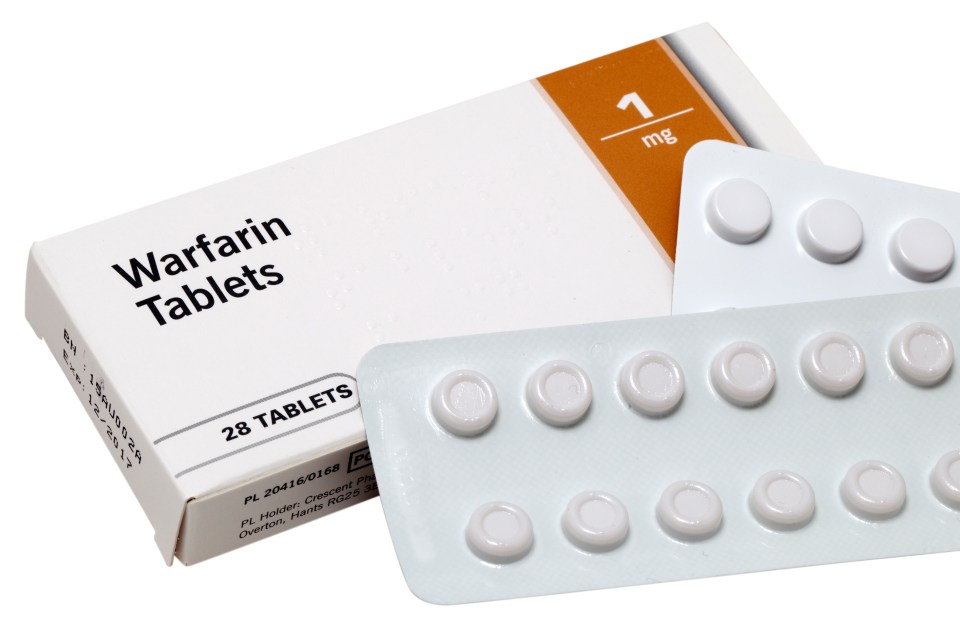BRITS taking the heart medication warfarin have been warned not to mix it with popular daily vitamins – or risk triggering a potentially fatal reaction.
Warfarin is the most widely prescribed anticoagulant drug in the UK, prescribed to millions of patients who suffer from blood clots or irregular heartbeat.
It stops blood clots from forming, reducing the risk of life threatening strokes and heart attacks.
Victoria Taylor, a dietitian at the British Heart Foundation (BHF), warned against mixing the medication with common health supplements like vitamin K, omega-3 and St John’s wort.
“Many different supplements are available in the shops and on the internet, some of which make claims about improving specific conditions like heart disease,” she wrote charity‘s Heart Matters magazine.
“But these claims are not always true.
“Some supplements can affect the medicines you are taking, causing side effects.
“For example, vitamin K, omega-3 and St John’s wort all interact with the blood-thinning drug warfarin.”
Vitamin K supplements can make warfarin less effective.
Foods rich in the vitamin – like leafy greens, chickpeas, olive oil and mature cheese – can also affect how the drug works.
But it’s still important you eat foods containing vitamin K, so rather than leaving them out of your diet, the NHS recommends you eat similar amounts of them regularly – rather than increasing and decreasing consumption.
This will mean the level of vitamin K in your blood stays fairly constant and your blood is less likely to form deadly clots.
Meanwhile, omega-3 supplements could increase the anti-coagulant effects of warfarin, raising the risk of bleeding.
While warfarin has huge benefits for people at risk of blood clots, it can make people bleed more than normal – from increased bleeding from minor cuts, to nosebleeds, bleeding gums and bruises.
According to NHS guidance, this type of bleeding is not dangerous and usually stops on its own. If it does not, patients are advised to contact their GP.
In rare cases, warfarin can trigger serious bleeding, sometimes without any obvious cut or injury. This can be life-threatening and needs urgent medical attention.
Warning signs include a nosebleed lasting more than 10 minutes, vomiting blood, or coughing up blood.
Very rarely, warfarin may cause bleeding in the brain. Symptoms include slurred speech, a sudden and severe headache, difficulty breathing or any heavy bleeding where blood is spraying or pooling.
Patients are advised to call 999 immediately in such cases.
Finally, combining St John’s wort with warfarin could “can increase your risk of side effects”, according to the NHS.
Foods that can interact with medicines
Certain foods can interact with medications, potentially altering their effectiveness or causing side effects.
Common examples include grapefruit, leafy green vegetables, and certain dairy products.
It’s important to be aware of potential interactions and consult with a doctor or pharmacist for guidance.
Here are some key food interactions:
Grapefruit
Grapefruit and its juice can interfere with the absorption and metabolism of many medications, including statins (cholesterol-lowering drugs) and some blood pressure medications.
Leafy green vegetables
Leafy green vegetables like spinach, kale, and broccoli are rich in vitamin K, which can affect the effectiveness of blood thinners like warfarin (Coumadin).
Dairy products
Dairy products, especially those high in calcium, can interfere with the absorption of certain antibiotics (tetracycline, ciprofloxacin) and some iron supplements.
Alcohol
Alcohol can interact with many medications, potentially enhancing their effects (like drowsiness) or reducing them.
“Do not take St John’s wort, the herbal remedy for depression, while you’re taking warfarin.”
Victoria cautioned patients looking to improve their heart health to be wary of supplements in general.
“Taking a supplement cannot undo the negative effects of an unhealthy diet,” she wrote.
“Research also shows that supplements do not help to stop or improve heart and circulatory diseases.
“In some cases, supplements can even be harmful.
“You may think supplements are healthier than food because they contain high levels of vitamins and minerals.
“But more is not always better. Having too much of some vitamins and minerals can be bad for your health.”
Avoid any multivitamins that include a mix of antioxidant vitamins such as vitamin A, vitamin E and beta-carotene, the dietitian stressed.
“This is because research shows these supplements do not improve cardiovascular disease and are linked to a raised risk of death.”
Victoria urged patients to speak to their doctor before trying any supplements.
“If you need them they will prescribe or recommend them,” she said.
But she said the one exception to this rule was vitamin D supplements.
“It is recommended we all take 10 micrograms a day of vitamin D supplement in the autumn and winter, because vitamin D is mainly made in our bodies with the help of sunlight,” she explained.
“Just a little comes from food.”
The cheap pill has been linked to a reduced risk of heart attacks in research.
It has also been suggested that children lacking vitamin D may be at higher risk of heart disease later in life.
“Apart from [vitamin D], a healthy, varied, balanced diet provides all the energy, vitamins and minerals you need,” Victoria said.













